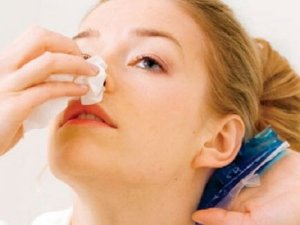What to Do When Your Nose Bleeds


Written and verified by psychologist Valeria Sabater
You have probably been faced with this situation at some time: a relative who gets a nosebleed or you experience the nosebleed yourself. Why do they happen? What causes nose bleeds? What to do when your nose bleeds?
Why Do You Get Nosebleeds?
Don’t worry, most of the time the reason behind a nosebleed is not very serious. It is somewhat common in adults as well as children. Your nose has a lot of very small blood vessels that can break due to temperature changes or colds, for example.
The air that moves through your nose can dry out or irritate the membranes that cover its interior, forming scabs that can also break and cause nosebleeds.Because the temperature is an important factor in causing these ruptures, it is common for you to have more nosebleeds in the winter.
The majority of these nosebleeds happen in the front part of the nasal septum. They rarely happen in the deeper part of the nose. Although it’s true that the latter are more difficult to control, don’t worry. None of them cause death. These are the main causes:
- Irritation from Allergies or a cold
- Very cold or dry air
- Blowing your nose very hard or picking your nose
- Any lesions or even having a deviated septum
- Chemical products
- High blood pressure
- In extreme cases: possible tumors
What To Do When Your Nose Bleeds?
The first thing you should do when you or someone else gets a nosebleed is to remain calm, especially in the case of children. Calm them down and tell them that it’s okay and it will be over soon. You should keep in mind the following guidelines about what to do when your nose bleeds:
- The first thing you should do is sit down and lean your head back. Why? Because you will prevent yourself from swallowing blood. Breath through your mouth.
- Then, sitting down, gently squeeze your nose, not the septum but the soft part between your thumb and index finger (so that the nasal cavities are closed). After 2 minutes, let it go, then pinch it again and let it go to see if the bleeding has stopped. Breath through your mouth.
- Remember to keep your head back to avoid swallowing blood.
- Every five minutes, check to see if your nose is still bleeding.
- If it doesn’t stop, you can apply a little bit of ice on the bridge of your nose for a few seconds to stop the bleeding.
- People usually cover their nose with gauze, which is fine but it’s important to not completely cover your nose. Just put a small amount of gauze on. Do not obstruct your nasal passage completely.
- Another thing to keep in mind that it is not recommended to lay down while you have a nosebleed. Sometimes you make mistakes and many people tend to ask people that have a nosebleed to lay down on the ground or the couch. This is not a good thing to do because as we already said, you run the risk of swallowing blood. The best way is to lean your head back so that the blood flows from below and to not cover it up.
- Another tip to keep in mind: avoid blowing your nose for a few hours after you have a nosebleed. This can cause you to start bleeding again.
- If you see that your nosebleed doesn’t stop, you should go to a doctor to control the bleeding. It’s common to apply a nasal decongestant spray to seal the small veins and control the bleeding.
See also: The 10 Best Natural Decongestants
When to Contact a Medical Professional
You should go to a medical center in the following cases:
- The nosebleed doesn’t stop after 20 minutes.
- You get a nosebleed after you have gotten hit in the head. This may indicate a serious head injury.
- If you get hit in the nose and besides bleeding, it is deformed. It’s possible that you have broken your nasal septum, which is very painful.
You should also keep the following aspects in mind:
- You tend to get frequent nosebleeds, once or more times every week and it is not due to colds or temperature changes. Go see a doctor immediately.
All cited sources were thoroughly reviewed by our team to ensure their quality, reliability, currency, and validity. The bibliography of this article was considered reliable and of academic or scientific accuracy.
Morgan, D. J., & Kellerman, R. (2014). Epistaxis: Evaluation and treatment. Primary Care – Clinics in Office Practice. https://doi.org/10.1016/j.pop.2013.10.007
Diamond, L. (2014). Managing epistaxis. Journal of the American Academy of Physician Assistants. https://doi.org/10.1097/01.JAA.0000455643.58683.26
Petruzzelli, G. J., & Johnson, J. T. (1989). How to stop a nosebleed. Postgraduate Medicine. https://doi.org/10.1080/00325481.1989.11704409
This text is provided for informational purposes only and does not replace consultation with a professional. If in doubt, consult your specialist.








